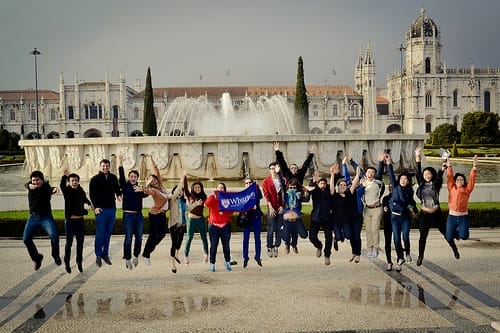Wharton’s emphasis on global and social impact initiatives was fully evident during the undergraduate Wharton International Program immersion trip to Portugal and Morocco from March 1 to 11. Working with Portuguese alumnus Ricardo Reis, GrW’05, an associate dean for international relations at Lisbon’s Catholic University, Lee Kramer from the Wharton Undergraduate Program put together an eye-opening experience for the lucky students, and for lucky me too. We spent four days in Morocco, where they took part in service projects at Rhamna Skills and Noor Hospital and had meetings with OCP, INJAZ and Boston Consulting Group. After touring Casablanca, Fez and Marrakech, we traveled to Lisbon, Portugal.
Landing in one of the oldest nation-states in the world, independent since the 12th century, we joined our counterparts at the Catholic University for discussions about the Portuguese economy, the European debt crisis, and social impact initiatives at innovative Portuguese companies such as GALP, Delta Company and Logoplaste.
We also learned fun facts throughout the day, including:
• Portugal has three daily newspapers, two of which are in Lisbon, that focus exclusively on football.
• While Americans may find late arrivals unprofessional, the Portuguese take more of a task-based approach to time so, while late arrivals are acceptable, leaving early before completing the task is a sign of unprofessionalism.
• Portugal was founded in 1143, and its border with Spain, established in 1250, is one of the oldest in the world.
• The country also has one of the longest-running international treaties, a mutual-protection treaty established in 1386 with England.
The students really had a chance to interact as they brainstormed and analyzed potential solutions to encourage young people to save money in both countries. After a lively discussion, a consensus emerged that financial literacy programs need to target the very young and be focused on rewards, not punishment. It was easy to forget that I was sitting amongst 20-year-olds as the solutions proposed showed a level of maturity and desire to improve society not often seen amongst professionals many years their senior.
One of the most interesting sessions was led by Ricardo, who directed the group to an incredibly interesting website, http://populationpyramid.net/, that graphically shows the distribution of ages and sexes of populations of every country in the world, not only in the present but also in the past and forecasted future. The two countries the students visited—Portugal and Morocco—could not have been more different. With the demographic trends in Portugal and the rest of the European Union, internationalization is not a choice, it’s an imperative.
I have walked away from this experience with a new perspective on the world that I can only imagine will enhance not only our knowledge, but also the insights the students will be able to share in the Wharton classroom.


























